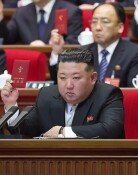Distorted Blame Game
Opposition parties including the main opposition Democratic Party recklessly demanded the dismissal of the defense minister and the navy chief of staff soon after the sinking of the Cheonan. With mounting evidence suggesting North Koreas role in the incident, the opposition has shifted the orientation of its argument but still seeks to hold the administration and military accountable. The parties say the defense minister and the military must be held accountable, saying the Lee Myung-bak administrations hard-line policy toward Pyongyang triggered the sinking and that the government failed to handle the crisis promptly and properly. This same line of argument was made at a policy forum Thursday on the June 2 local elections attended by the heads of five major parties. Democratic Party Chairman Chung Sye-kyun criticized the government at a general gathering of his partys lawmakers Friday, saying, Somebody must take responsibility, but none from the levels of the president to the ships captain have done so.
If the military failed to ready itself for such a situation or failed to handle it properly, it must be held accountable. A joint investigation team is probing the cause of the fiasco, while the Board of Audit and Inspection is also conducting its own inspection. So the culprit behind the sinking will soon be announced. It will not be too late to hold someone accountable at that time, if anyone is to be held responsible. Demanding that the government to punish those responsible for the Cheonan incident at this time seems to bear a hidden intent. Opposition parties might be trying to blame South Korean authorities for the sinking to dilute the Norths responsibility.
If these parties want to hold those responsible purely for the sake of national security, then they are right. People who emphasize the need to punish those in South Korea despite growing evidence of the Norths involvement have said nothing about the attackers. Even though the attacker committed a premeditated crime, the parties are trying to blame the victims, saying Why were you victimized? or It was your fault for being attacked.
These people are even taking North Koreas side, urging South Korean authorities not to suspect the North as the culprit because of lack of specific evidence. Trying to hold those responsible for the sinking is apparently derived from a move to blindly side with the North, rather than stemming from loyalty and patriotism for their country and value of national security. Can such people be recognized as citizens of the Republic of Korea despite blaming the Lee governments hard-line policy for causing this incident?
Using the disaster as a turning point, political circles should stop being irresponsible and trying to pressure the military. Under the liberal Kim Dae-jung and Roh Moo-hyun administrations, Seoul even ordered the military to refrain from responding to attacks even if fired on by the North first. Under such circumstances, how can the South Korean military take responsibility for national security? If politicians try to hold those in the South Korean government and military responsible without taking stern countermeasures against an attack that nearly constituted an act of war, this will be nothing short of exposing the South to a double attack by the North.







